How Storytelling Can Help Your Child?
How Storytelling Can Help Your Child?
At a first glance
We all love stories, we have grown up listening to them. For a minute, sit and think back, down the memory lane. Your grandmother must have told you a fable when she was combing your hair. Every mom would have recited a prayer and told you a religious story when you were helping her in the kitchen.
The older sibling, for sure, must have scared you off with a horror tale, just when you were about to sleep after all the lights were switched off. Your dad must have narrated a biopic of a sports person when you were sitting next to him watching cricket.
Be it books or movies or drama, there is a story which is being narrated to us through different media of expression and communication. Even as adults, to this day, a book or a movie impact us so much that we never know at which point of time our minds get influenced and our thought processes change, and our lives will never be the same again. Stories help us understand the world better, make sense of things around us and react to a challenging situation in a methodical manner.
Why stories?
When we as adults can gain so much from stories, Imagine, how much the young minds, with their curiosity and their natural inclination towards learning, can benefit from them?? A child’s mind is a blank canvas, if painted with the right choice of colours, it can turn into a beautiful painting. It’s like clay, which we as responsible parents can mould into whichever shape we choose to.
Stories are the best way to introduce our little ones to the world of imagination. It’s the first step towards creativity. Kids love to imitate. So, when they hear a good story, they would want to imitate the character inside that story. Be it naughty Pepper sharing his toys with his friends or a larger than life Superhero trying to save the world, they imbibe it all. Stories are a holistic portkey to the entire knowledge which you would like to give your children about the world they are going to live in.
Stories teach us how to face a situation – how somebody else faced a similar situation and how they got over it? Relevant issues which children face like confidence, communication, stage-fear, sharing – these all can easily be taught to them when they are shown how another child in another setting is dealing with the problem in hand.
The most important aspect of stories is and always will remain knowledge. It could be a knowledge of an event which has occurred hundreds of years ago or an event which is happening on a different continent. It could be a tale from a different culture or a struggle in a difficult climate. Children have only to gain from stories, and nothing to lose
Stories – myth away from reality??
When I do my Christmas workshop, parents come and ask me,” Is it a right thing to make children believe in Santa? That he comes down the chimney at midnight and keeps toys for the children. That he has a sleigh with eight reindeers pulling it in the sky. Why feed fancy tales in children’s minds?”. But looking at the other side of the story, Children are also told that Santa only comes when they behave like good children when they help others when they learn to give away their old toys to the poor.
If Santa takes them away from reality, so do the superheroes. What the parents miss is that stories are a more dramatic medium to inculcate the right morals in the children. They derive their first role models from stories. As they grow up, children will understand the difference between make-believe and reality, they will outgrow the fancy tales which were taught to them, but the crux of what is good and what is bad is already drilled in their minds.
Story Telling Techniques
Stories can be told to children in multiple ways. Showing a movie or reading a book is the best way to start off with the whole process. Why not make it a little bit more interesting to them?
Sing a song, play with puppets, make them laugh, enact few snippets?
A little bit of art, a little bit of mess, riddles to crack, such fun to guess!!
More the merry, more their involvement. More their involvement, more their interest, and thus attention. And once you get their attention, you can do wonders with them.
Here are some tips for an engaging story session.
- In a Group: Children always like company. Storytelling with a group of children always works better than one-on-one. They emulate each other, and also picture themselves as different characters in the story. They would love to contribute to the discussion and talk about what they think that character should do as well as love making sillier expressions looking at each other. In short, a group is always better.
- Props: Props play a vital role in any storytelling session. Props are a visual medium through which the children will start imagining a story. Visual presentation works the best, especially with small children to gain their attention span.
- Make children a part of a story: Let the children enact a part of the story. Enacting is the best way to get the child into the groove of the character. Give them some lines, ask them to act it out loud with expressions.
- Depictions and Reflections: The story has to culminate with an activity. It could be as simple as asking the children to draw what they understood or give them a sheet to colour and talk about that scene or character. For younger children, you can also ask them to narrate bits and pieces of the story and pen down their reflections. When you read and re-read the reflections back to them, they will relate to the story much better.
Summary: To conclude, the benefits of storytelling are numerous. And somewhere in the back of our minds, we all know that. The techniques are simple. All it takes is a dedicated effort from us adults to introduce children to the world of stories. Stories will shape them, mould them and make them better individuals than what they are today.
This article has been written by Anantha who is a blogger with 1SpecialPlace. We would love to hear how you engage your children in storytelling. Leave us a reply.
View this post on Instagram
- Speech Therapy Activities for Ganesha Chaturthi - September 6, 2024
- 5 Ways to Help Your Child’s Language Development - August 31, 2024
- Epilepsy – Myths and Facts - August 20, 2024

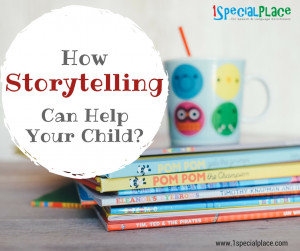
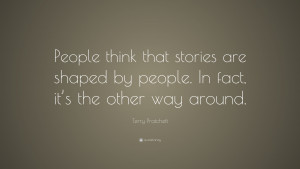
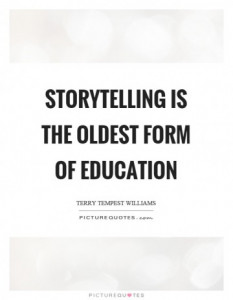

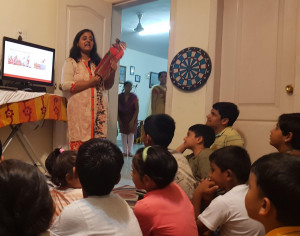
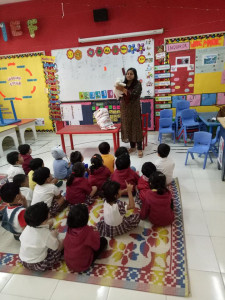
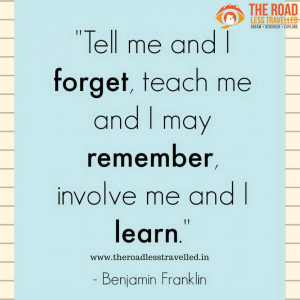
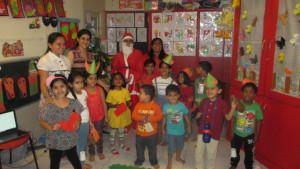


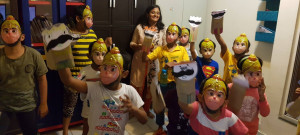
Leave a Comment
(0 Comments)